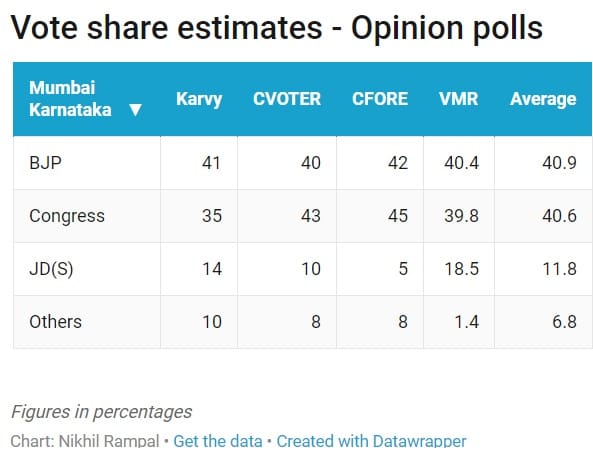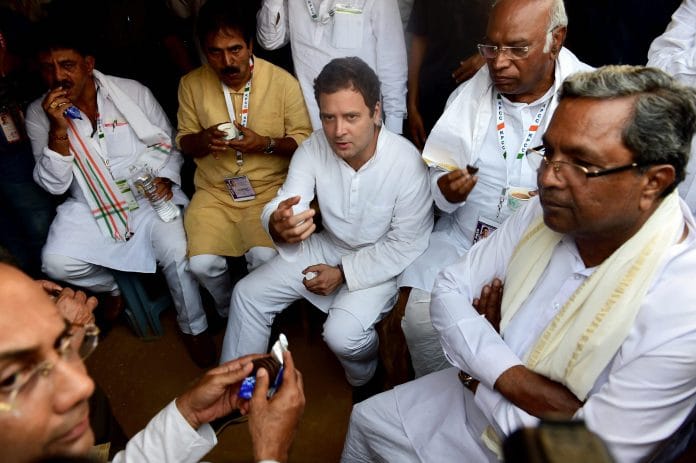The Lingayats have traditionally voted for a leader and not a party. A chief ministerial aspirant from their community would make them vote for that party.
In the 1924 Belgaum Congress session, presided over by Mahatma Gandhi, the clarion call for the unification of princely Mysore with the Kannada-speaking regions of the Nizam’s kingdom and the Bombay and Madras Presidencies came in the form of the mellifluous rendition of Huligol Narayana Rao’s poem: Udayavaagali Namma Cheluva Kannada Naadu (May our charming Karnataka arise).
Since the 1890s, the ‘Mumbai-Karnataka’ region has been at the forefront of unification. It has given the state 50 seats, six chief ministers, and is dominated by the Lingayat community. The assembly polls this month will be a litmus test for chief minister Siddaramaiah’s decision to accord minority status for Lingayats. Will it backfire or benefit the Congress?
The region used to be a Congress bastion. But things changed dramatically in 1990, when Rajiv Gandhi, the party president at the time, unceremoniously sacked chief minister Veerendra Patil through a letter sent from an airport. Patil, a tall Lingayat leader, had been instrumental in the Congress’s biggest victory in 1989, when it won 179 seats. Rajiv’s erratic decision reduced the Congress to 36 seats in the next polls, and alienated the community, which gravitated first towards the Ramakrishna Hegde-led Janata Dal, and finally consolidated under Yeddyurappa.
Read: An old & bitter struggle between these two castes can kill Congress’s chances in Karnataka
Like their rivals, the Vokkaligas, in south Karnataka, the Lingayats too have traditionally voted for a leader and not a party. A chief ministerial aspirant from their community would make them vote for that party. Hence, when Yeddyurappa formed his Karnataka Janata Paksha (KJP), the BJP won only 13 seats of the 50 seats in this region, while the Congress managed 31. However, with Yeddyurappa back in the fold, in the 2014 parliamentary elections, the BJP won 39 assembly segments with over 50 per cent vote share.
Siddaramaiah’s game plan is to split the BJP’s Lingayat vote bank. The VMR poll suggested that 40 per cent of respondents were positively influenced by the minority status recommendation, though an equal number were against it. Many Lingayat leaders, as also Basavaraj Horatti, JD(S) leader and president of the Jagathika Lingayat Mahasabha, expressed anger over the BJP’s diplomatic silence on the issue.
The Congress has fielded 49 Lingayats this time. Its social media campaigns seek to create confusion in the minds of Lingayat voters about the supposed diminishing stature of Yeddyurappa within the BJP – over how his son did not get a ticket, and how he did not share the dais with Prime Minister Narendra Modi in his rallies.
The BJP has been on strong ground in the Mumbai-Karnataka region since the 1990s, following the Idgah Maidan controversy in Hubballi. The ownership of the land was contested between the Hubballi-Dharwad Municipal Corporation and the Anjuman-e-Islam. Firebrand BJP leader Uma Bharti defied curfew and courted arrest after hoisting the Tricolour at the disputed site. The agitation kick-started the careers of many BJP leaders such as Jagadish Shettar and Prahlad Joshi, and spread the party’s influence in Mumbai-Karnataka.
An important issue here is the Mahadayi river water-sharing dispute with Goa that erupted in the 1980s. Emerging from the Western Ghats in Belagavi’s Khanapur taluk, the river flows westwards towards Goa. Karnataka began building canals, barrages and dams to link its tributaries Kalasa and Banduri, diverting water to the Malaprabha river basin. Karnataka has argued that this augments water to four parched districts and meets irrigation, drinking, agriculture and power-generation needs. The matter has been before the Mahadayi Water Disputes Tribunal.
Yeddyurappa’s grand announcement at the end of BJP’s Parivarthana Yatre in December 2017 of a commitment from Goa CM Manohar Parikkar to release water ended in a disastrous embarrassment. The BJP had hoped that even a small breakthrough would reap them rich electoral dividends. But the BJP’s Goa allies refused to budge, and to make matters worse, Goa’s irrigation minister Vinod Palyekar’s slurs against Kannadigas vitiated matters.
The Congress has been pointing to the deafening silence of the Centre on resolving the issue as proof of the BJP’s indifference to this region. Yeddyurappa, on the other hand, promises in every rally that he’ll fix the problem within 100 days of being voted to power.
Like in Old Mysuru, farmers have been suffering from droughts, suicides and low prices for sugarcane. To demonstrate solidarity, the BJP launched a massive door-to-door Mushti Dhanya Sangraha Abhiyana that culminated in Gadag. Party workers collected fistful of grains from houses of farmers who committed suicide, and community meals were cooked and eaten.
Linguistic clashes and border disputes with Maharashtra have dogged the region. From the 1960s, Maharashtra has been claiming ownership over 865 villages and towns with a higher percentage of Marathi speakers. The Mahajan Commission in 1967 recommended an equitable transfer of villages between the states, and that Belgaum would remain in Karnataka. Maharashtra’s rejection of the report landed the matter in the Supreme Court and has since been a bone of contention.
Belgaum (now Belagavi) becomes the convenient scene of Kannada sub-nationalism for all parties, rallying against the Maharashtra Ekikaran Samiti (MES). An assembly session too was held there in 2006 to symbolically assert Karnataka’s hold over the border city. Ironically, for many farmers in villages such as Kudrimani in Belagavi, their homes are in Karnataka and their farmlands in Maharashtra. Power and water supply are provided by Maharashtra and are paid for by the Karnataka government. Maharashtra has disconnected power in the past alleging non-payment of bills. Dealing with bureaucracies of two states for their livelihood and for buying and selling their produce, equipment and lands add to the farmers’ misery.
Badami, in Bagalkote, which has been the capital of the Chalukya kingdom, is in the limelight for the first time, with a high-voltage contest between Siddaramaiah and Ballari MP B. Sriramulu. The former hopes the dominance of the Kurubas will see him through, while Sriramulu hopes for support from tribals and Lingayats.

Opinion polls till the end of April indicate a neck-and-neck fight, with the BJP edging ahead by 0.38 per cent, hoping to widen the margin.
Dr Vikram Sampath is a Bengaluru-based award-winning author/historian and political commentator.
This is the fourth essay in a series by the author on the upcoming Karnataka elections. Read the first, second and third parts here.







Congress Party leaders brag that they are secularists. The secularists by definition are not religious, they are impartial between religions and they don’t take sides between religions. However, in the sixty years they reigned, they invented, designed, followed and imposed anti- Hindu ideas all over India. To crown this hypocrisy, the congress party in Karnataka invented and imposed a new religion in the name of Lingayats. How do followers and supporters of Congress party, such as the current commentator and the current TV channel explain the establishment of a new religion using government machinery, that is supposed to be secular. Since they don’t have a sensible way to support Karnataka Congress, they avoid it. Since it is a contentious issue that may decide the elections, it is fair this issue be brought into focus and the congress party hypocrisy be exposed. Nary is there a mention of this in the so called intellectual discussion.
Your headliner Congress splitting Lingayat votes is misleading…… In fact as is Britishers divided and ruled illiterate Indians , present day Khongress still wanted to divide and rule by dividing Hindu votes…. The same way Khongress granted minority status to Jain community just before 2014 historical elections…. What status powerful and mostly rich Jain community need…… Don’t be soft on the political party Khongress who has always made us to be illiterate and bereft of medical facilities…… Education and health into the hands of private parties, is the biggest blunder by Khongress since Independence….